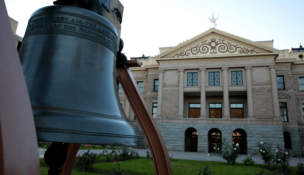Law to levy tax for city band nears final note
Howard Fischer, Capitol Media Services//February 18, 2019//[read_meter]
Law to levy tax for city band nears final note
Howard Fischer, Capitol Media Services//February 18, 2019//[read_meter]
Flagstaff, Mesa, or Tucson may not be River City. But if you’re counting on music to keep the local kids out of trouble, with a Capital T, you’d better act quickly:...















